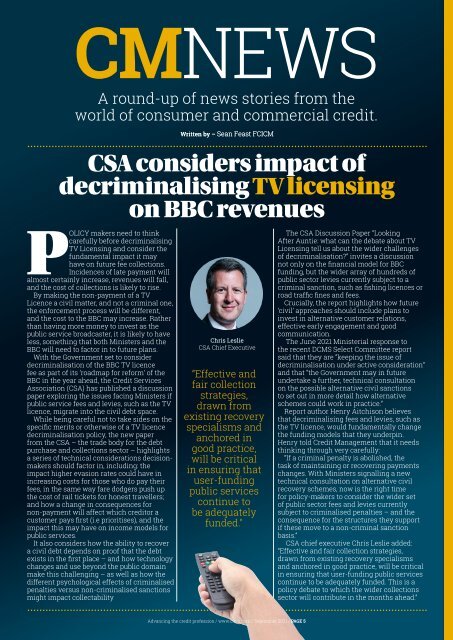CM September 2021
You also want an ePaper? Increase the reach of your titles
YUMPU automatically turns print PDFs into web optimized ePapers that Google loves.
<strong>CM</strong>NEWS<br />
A round-up of news stories from the<br />
world of consumer and commercial credit.<br />
Written by – Sean Feast FCI<strong>CM</strong><br />
CSA considers impact of<br />
decriminalising TV licensing<br />
on BBC revenues<br />
POLICY makers need to think<br />
carefully before decriminalising<br />
TV Licensing and consider the<br />
fundamental impact it may<br />
have on future fee collections.<br />
Incidences of late payment will<br />
almost certainly increase, revenues will fall,<br />
and the cost of collections is likely to rise.<br />
By making the non-payment of a TV<br />
Licence a civil matter, and not a criminal one,<br />
the enforcement process will be different,<br />
and the cost to the BBC may increase. Rather<br />
than having more money to invest as the<br />
public service broadcaster, it is likely to have<br />
less, something that both Ministers and the<br />
BBC will need to factor in to future plans.<br />
With the Government set to consider<br />
decriminalisation of the BBC TV licence<br />
fee as part of its ‘roadmap for reform’ of the<br />
BBC in the year ahead, the Credit Services<br />
Association (CSA) has published a discussion<br />
paper exploring the issues facing Ministers if<br />
public service fees and levies, such as the TV<br />
licence, migrate into the civil debt space.<br />
While being careful not to take sides on the<br />
specific merits or otherwise of a TV licence<br />
decriminalisation policy, the new paper<br />
from the CSA – the trade body for the debt<br />
purchase and collections sector – highlights<br />
a series of technical considerations decisionmakers<br />
should factor in, including: the<br />
impact higher evasion rates could have in<br />
increasing costs for those who do pay their<br />
fees, in the same way fare dodgers push up<br />
the cost of rail tickets for honest travellers;<br />
and how a change in consequences for<br />
non-payment will affect which creditor a<br />
customer pays first (i.e prioritises), and the<br />
impact this may have on income models for<br />
public services.<br />
It also considers how the ability to recover<br />
a civil debt depends on proof that the debt<br />
exists in the first place – and how technology<br />
changes and use beyond the public domain<br />
make this challenging – as well as how the<br />
different psychological effects of criminalised<br />
penalties versus non-criminalised sanctions<br />
might impact collectability<br />
Chris Leslie<br />
CSA Chief Executive<br />
“Effective and<br />
fair collection<br />
strategies,<br />
drawn from<br />
existing recovery<br />
specialisms and<br />
anchored in<br />
good practice,<br />
will be critical<br />
in ensuring that<br />
user-funding<br />
public services<br />
continue to<br />
be adequately<br />
funded."<br />
The CSA Discussion Paper “Looking<br />
After Auntie: what can the debate about TV<br />
Licensing tell us about the wider challenges<br />
of decriminalisation?” invites a discussion<br />
not only on the financial model for BBC<br />
funding, but the wider array of hundreds of<br />
public sector levies currently subject to a<br />
criminal sanction, such as fishing licences or<br />
road traffic fines and fees.<br />
Crucially, the report highlights how future<br />
‘civil’ approaches should include plans to<br />
invest in alternative customer relations,<br />
effective early engagement and good<br />
communication.<br />
The June <strong>2021</strong> Ministerial response to<br />
the recent D<strong>CM</strong>S Select Committee report<br />
said that they are “keeping the issue of<br />
decriminalisation under active consideration”<br />
and that “the Government may in future<br />
undertake a further, technical consultation<br />
on the possible alternative civil sanctions<br />
to set out in more detail how alternative<br />
schemes could work in practice.”<br />
Report author Henry Aitchison believes<br />
that decriminalising fees and levies, such as<br />
the TV licence, would fundamentally change<br />
the funding models that they underpin.<br />
Henry told Credit Management that it needs<br />
thinking through very carefully:<br />
“If a criminal penalty is abolished, the<br />
task of maintaining or recovering payments<br />
changes. With Ministers signalling a new<br />
technical consultation on alternative civil<br />
recovery schemes, now is the right time<br />
for policy-makers to consider the wider set<br />
of public sector fees and levies currently<br />
subject to criminalised penalties – and the<br />
consequence for the structures they support<br />
if these move to a non-criminal sanction<br />
basis.”<br />
CSA chief executive Chris Leslie added:<br />
“Effective and fair collection strategies,<br />
drawn from existing recovery specialisms<br />
and anchored in good practice, will be critical<br />
in ensuring that user-funding public services<br />
continue to be adequately funded. This is a<br />
policy debate to which the wider collections<br />
sector will contribute in the months ahead.”<br />
Advancing the credit profession / www.cicm.com / <strong>September</strong> <strong>2021</strong> / PAGE 5


















